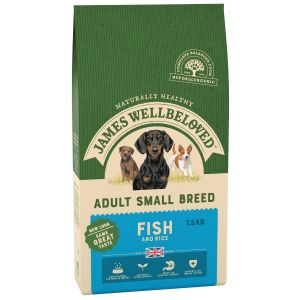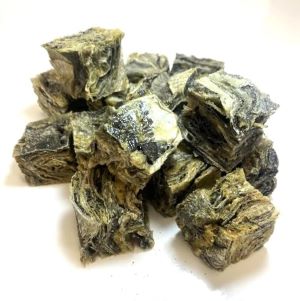We love fish, fish is an excellent source of many nutritional value for us. Just like us dogs also enjoy eating fish. But it is not equally good for dogs. Mackerel is also a fish, but can dogs eat Mackerel?

Let’s find out the nutritional value of Mackerel fish, its benefits and its alternatives for your dog. And answer questions like, Can dogs eat mackerel safely and healthily? Is mackerel good or bad for dogs? How much and how often should dogs eat mackerel?
You Might Also Like:
Can Dogs Eat Mackerel?
Mackerel is a common name applied to a number of different species mostly from the Scombridae family. Dogs can eat mackerel but in small portions.
They are consumed by humans widely, as they are excellent sources of protein, omega-3 fatty acids, and other nutrients. They are also known for their different texture and appearance.
Dogs have evolved as carnivore animals, their main food is meat. But they can also benefit from different foods like grains, fish, and fruits. This type of balanced diet can provide essential nutrients that are essential for the growth, development and health of your dog.
“Fish can provide dogs with protein, healthy fats, and minerals, which can help dogs with certain health conditions, such as allergies, joint issues and heart conditions. Fish skin can be a valuable source of collagen, which is especially important for the bone and skin health of senior dogs”, confirms Dr Leslie Gillette from PetMD.

However, not all fish are good for dogs, some may be high in fat, mercury, or additives. They can cause allergic reactions in dogs. Hence, always choose the right type of fish for your dog.
Potential Risks
Mackerel can provide dogs with protein, omega-2 fatty acids, and vitamin D. But, not all types of Mackerel fish are safe for dogs. There are some potential risks which should be avoided. Here are some of them:
- High mercury levels: Some bigger types of mackerel such as king mackerel and Spanish mackerel, may have high levels of mercury. This can be toxic to dogs. Mercury can cause neurological damage, kidney failure, and other health problems in dogs[1].
- Salt content: Mostly canned or smoked mackerel are high in salt. High salt in the body can cause dehydration, high blood pressure, and sodium poisoning in dogs. We should avoid fish with seasonings and other harmful ingredients to our dogs[2].
- Allergies: Some dogs may be simply allergic to fish, which can cause danger to the immune system. Symptoms like itching, swelling, sneezing, coughing, wheezing, vomiting, or diarrhoea may appear.
Whelks are another type of seafood that some owners may want to feed their dogs. Be sure to check if whelks are safe for dogs by reading our article “can dogs eat whelks?” before feeding them.
How Do I Feed My Dog Mackerel?
Mackerel is a nutritious and delicious food. Mackerel can be a healthy and tasty treat for dogs if it is prepared properly and fed in moderation, it should not be given too much or too often. Here are some tips:
Choose the Right Type of Mackerel
Introduce mackerel fish gradually into your dog’s diet. As mentioned earlier some mackerel fish are high in mercury and salt content, which should be avoided in order to prevent any reaction to the immune system.
Choose low-mercury fish options like chub and North Atlantic mackerel. Avoid king and Spanish mackerel as they are high in salt and fat which may harm the dog’s diet.

Cooking Methods for Dogs
A well-cooked Mackerel will prevent parasites or toxins that can cause illness or infection. Cooked fish also makes it easier to chew and digest. You can make Mackerel in plain water or steam it, without any salt or spicy. Remove any bones, skin, or scales from the fish before serving your dog.
Proper Serving Size and Frequency
Mackerel should be given as a treat or alternate to balance a diet, not as a meal frequently. The amount of mackerel fish a dog can digest depends on the dog’s size, age, activity level, and health condition.
A general rule of thumb is to feed no more than one ounce of fish per 10 pounds of body weight per day. For example, a 20-pound dog can have up to two ounces of mackerel per day.
Monitoring for Adverse Reactions
Beware of the symptoms of poisoning or allergy. After feeding your dog the fish look for signs of distress or discomfort in your dog.
By monitoring their dogs for any adverse reactions due to eating fish, dog owners can ensure that they are feeding their dogs in a safe and healthy way.

Consulting With the Vet
Mackerel can be a great addition to a dog’s diet if it is given in moderation and under the vet’s guidance. Always be careful as your dog’s health is your responsibility.
A vet will guide you more about the benefits and risks of feeding mackerel to your dog as well as the best cooking methods, serving size, and nutritional needs of the dog.
Want to learn more about feeding mussels to dogs? Check out our guide “Can Dogs Eat Mussels?”
Alternatives of Mackerel
Mackerel is a type of oily fish that is rich in omega-3 fatty acids, which are beneficial for your dog’s health. There are some alternatives od mackerel, here are some of them:
- Other fish: Some other fish that are high in omega-3 fatty acids include salmon, herring, and anchovies. These fish can supply equal benefits as mackerel, such as supporting your dog’s skin, coat, joints, and brain health. But look out for mercury content in the fish.
- Plant-based sources: If you prefer plant-based options and your dog enjoys that bite then Some options are flaxseeds, chia seeds, walnuts, and soybeans. However, the conversion rate is low, so you may need to feed your dog more of these foods to meet their omega-3 needs.
- Commercial Dog Foods: Another way to ensure proper nutrition is a high-quality commercial food that contains them. Look for an option which contains omega-3 supplements.
Black pudding is another food some dog owners may consider. However, it’s important to first understand if dogs can eat black pudding. Check our guide can dogs have black pudding for more information.
FAQs
How to Cook Mackerel for Dogs?
There are multiple ways in which you can serve your dog a tasty and healthy treat with a mackerel dinner. It can be boiled, or cooked with other ingredients. However, baking is the best way to preserve the nutrients and fatty acids for which mackerels are special.
What Are the Benefits of Mackerel for Dogs?
Mackerel is absolutely loaded with essential nutrients for your dog’s health and well-being! Mackerel fish is a great source of Omega-3. Vitamin B12, Vitamin D, and amino acids. This makes it a super healthy addition to your dog’s daily meals, or occasional treat for behaving well.
What Are the Fish That Dogs Can Not Eat?
Any large fish with a long life span is not safe for your dog to eat. These large fish—such as swordfish, tilefish, king mackerel, and albacore tuna fish—accumulate heavy metals; the high amounts of mercury in their system make them dangerous for dogs.
Can Dogs Eat Mackerel?
Yes, dogs can definitely eat mackerel! This oily fish is rich in fat and filled with many important nutrients that are essential for a dog’s health and well-being. Some of the vital nutrients in mackerel include Vitamin B12, vitamin D, and Omega-3 fatty acids.
Is Mackerel Good for Dogs Every Day?
Mackerel is absolutely loaded with essential nutrients for your dog’s health and well-being! Mackerel fish is a great source of Omega-3. Vitamin B12, Vitamin D, and amino acids. This makes it a super healthy addition to your dog’s daily meals, or occasional treat for behaving well.
Summary
In conclusion, Mackerel is a kind of fish that has a lot of good things for your dog’s health, like omega-3 fats, protein, and vitamins. This may help dogs to have shiny coats, strong joints, and a smart brain. But always in moderation, as it is high in salt and contains mercury too.
Feed your dog in small portions and look after them for any signs of distress. You may also consult with the vet about this. Feed your dog the right diet this will keep them healthy and happy!
Reference:
- Department of Health & Human Services. (n.d.-b). Mercury in fish– Better Health Channel.
- Sandra C. Mitchell, DVM, DABVP. (2023). Can dogs eat salt?- PetMD.






